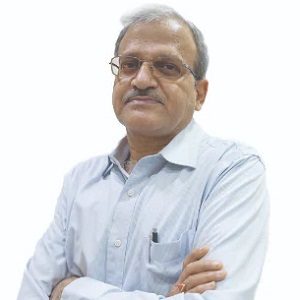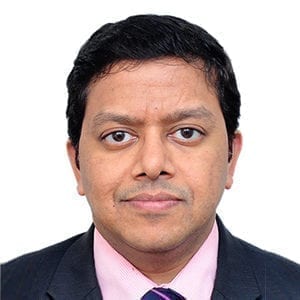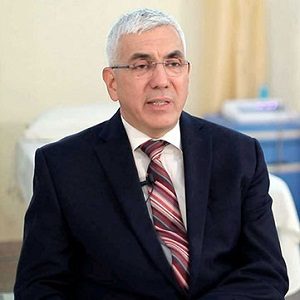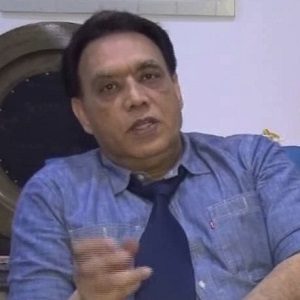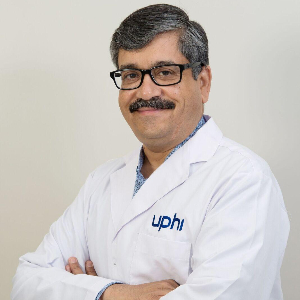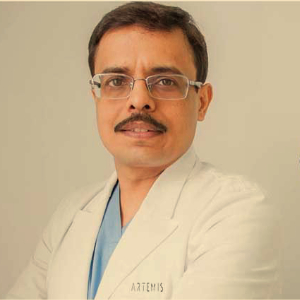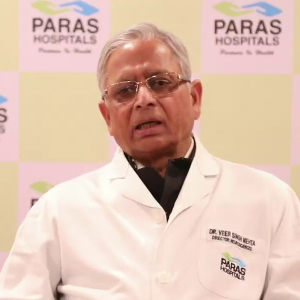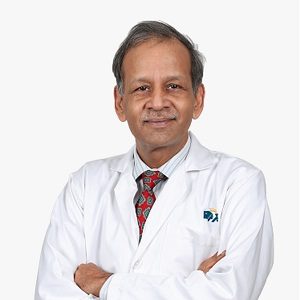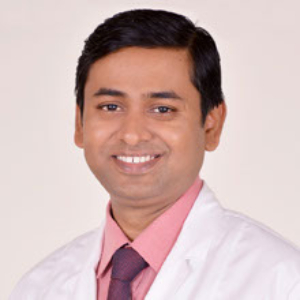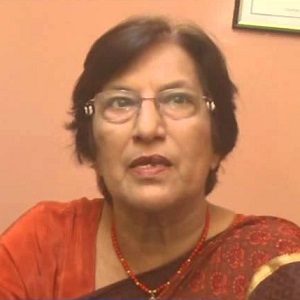Best Doctors in India for Carpal Tunnel Syndrome Treatment
- Pediatric Neurologist, New Delhi, India
- Over 30 years’ experience
Profile Highlights:
- Dr. Vineet Bhushan Gupta is a renowned pediatric neurologist with nearly three decades of experience in treating neurological disorders in children.
- Currently, he is practicing as a senior consultant at Indraprastha Apollo Hospital, New Delhi.
- Dr. Gupta is a certified fellow in Pediatric Neurology from London and the Pediatric Intensive Care Unit, Alder Hey Children’s Hospital of Liverpool.
- Dr. Vineet Bhushan Gupta specializes in Spinal fusion surgery. He also treats Spondylolisthesis, Epilepsy, pediatric stroke, Disc Desiccation, Spinal Stenosis, Fractured vertebrae, Herniated Disc, Disc Degeneration, Scoliosis, and developmental problems.
- Dr. Gupta has authored numerous research papers and studies that have appeared in a host of medical journals.
- Neurologist, New Delhi, India
- Over 15 years’ experience
Profile Highlights:
- Dr. Puneet Agarwal is one of the renowned neurologists in India known for his outstanding performance in the field of neuroscience.
- He is considered to be one of the first few doctors to successfully complete the Inflammatory Genes study in stroke patients and IV Valproate in status epilepticus.
- Dr. Agarwal is highly experienced in the Management of Parkinson’s disease, Deep Brain Stimulation, and Injection of Botulinum Toxin and is currently functioning as the Director of the Neurology Department of Stroke.
- Neurologist, New Delhi, India
- over 27 years experience
Profile Highlights:
- Dr. Mukul Varma is one of the best Neurologists in India, specialized in treating brain and spine disorders. With over 27 years of experience, the doctor has expertise in Parkinson’s disease, Speech and movement disorder, headache, and multiple sclerosis treatment.
- He is working as a senior consultant Neurologist with the prestigious Apollo Hospital, New Delhi.
- Dr. Varma is excellent at diagnosing and providing holistic treatment for meningitis, brain stroke, epilepsy, brain cancer, and many others. The doctor also performs stereotactic procedures for Brachial Plexus injuries.
- He has contributed 20 literary works to medical journals of national and international repute.
- Neurologist, New Delhi, India
- Over 42 years' experience
Profile Highlights:
- Dr. Anoop Kohli is one of the well-known Neurologists in India, having 42 years of clinical experience.
- He is interested in the treatment of Migraine, Brain Haemorrhage, Paralysis, Parkinson’s disease, Stroke, Paraplegia, Fits, and Meningitis.
- Dr. Kohli is a senior consultant at Apollo Hospital, New Delhi, and a pioneer, who first devised an intravenous thrombolytic treatment and developed the first Trans-Cranial Doppler Lab of India at Apollo Hospitals, New Delhi.
- Dr. Anoop Kohli is excellent at surgical intervention and therapies. He has contributed 40 publications to national and international journals.
- Neurologist, Gurugram, India
- Over 20 years’ experience
Profile Highlights:
- Dr. Sumit Singh is a well known Neurologist in India currently associated with Artemis Hospital in Gurgaon as the Director of the department of Neurology.
- He has an experience of 20+ years and specializes in the treatment and management of headache and movement disorders.
- He is the first Neurologist in India to introduce Botulinium toxin for the treatment of headache in 2002 and also used it for trigeminal neuralgia treatment.
- He has years of knowledge and experience in the treatment of neuromuscular disorders and is one of the best neurologists for the management of patients who have undergone Deep Brain Stimulation surgery.
- Dr. Singh is known to be the best for the planning and management of patients with Parkinson’s disease. He also provides treatment for patients suffering from Multiple sclerosis, Myasthenia gravis and Polymyositis.
- He has been associated with other prestigious hospitals before joining Artemis that includes All India Institute of Medical Sciences where he established the first Headache Clinic in North India. He also had an important role in starting the unit of Neuromuscular Disorders in the hospital.
- A member of esteemed medical societies and associations, he is equally interested in research and has been actively involved in clinical trials for Myasthenia gravis and Multiple sclerosis.
- Dr. Singh has also taught and trained several undergraduate and post graduate students and was a Faculty of Neurology during his stint at AIIMS.
- He holds credit of over 100 publications to his name in world renowned medical and scientific journals and has also authored and co authored several text books on neurology.
- Neurointerventional Surgeon, Gurugram, India
- Over 30 years’ experience
Profile Highlights:
- Dr. Vipul Gupta is one of the most highly experienced and skilled interventional neurologists in India with expertise in AVMs, Intracranial Aneurysms embolization, tumor embolization, and angioplasty.
- He holds the credit of performing over 300 brain AVM procedures and more than 1000 intracranial aneurysms along with 100 DAVF procedures for the endovascular treatment of intracranial aneurysms and arteriovenous malformations.
- Dr. Gupta specializes in stenting of arterial stenosis as well as carotid stenting and intra- arterial thrombolysis for acute stroke. His expertise also lies in neurovascular imaging techniques and procedures.
- Neurosurgeon, Gurugram, India
- Over 38 years’ experience
Profile Highlights:
- Dr. (Prof.) V S Mehta is a leading Neurosurgeon in India and is considered among the best neurosurgeons in the world.
- He holds an experience of over 38 years in the field and is an expert in Brachial Plexus surgery, brain stem surgery, spinal tumor surgery, brain aneurysms, and brain tumor surgery.
- He has been honored with the Padma Shri for his dedication and contributions to neurosurgery and spine surgery in India.
- In Paras Dr. V S Mehta has been part of the team to first use the Image-Guided Brain Tumor Navigation Technology for Brain tumor surgery in India.
- Neurosurgeon, New Delhi, India
- Over 27 years experience
Profile Highlights:
- Dr. Pranav Kumar is one of the best Neurosurgeons in India, having a good success record of over 27 years in performing deep-rooted tumors in the skull.
- Since 1996, Dr. Kumar has been working as a senior consultant neurosurgeon at Apollo Hospital, New Delhi.
- Dr. Pranav Kumar is skilled in surgeries for brain tumors deep-seated at the base of the skull and aneurysms affecting the cerebrovascular system.
- Dr. Kumar specializes in performing the complex ‘Auditory Brainstem Implant,’ where a Bionic device is inserted in the brainstem to recover the hearing capacity in deaf patients who cannot be treated with a cochlear implant.
- He completed microsurgery training at the National Neurosurgical Centre at Beaumont Hospital in Ireland.
- Neurologist, New Delhi, India
- Over 18 years’ experience
Profile Highlights:
- With 18+ years of experience in the field of neurology, Dr. Mukesh Kumar is one of the most prominent names in neuroscience, renowned for his expertise in the treatment of diseases like Myasthenia Gravis, Parkinson’s Disease, Botulism, and Movement Disorders.
- He is Gold Medalist in MBBS from Banaras Hindu University, India.
- Pediatric Neurologist, New Delhi, India
- Over 37 years’ experience
Profile Highlights:
- Dr. Veena Kalra is one of the renowned Paediatric Neurologists in India who has garnered much respect for her contribution to a new area of Pediatrics which is Pediatric Neurology for the country.
- She practices as a senior consultant at Apollo Hospital, New Delhi.
- The President of India has awarded Dr. Veena Kalra three medals for her work in treating kids with critical illnesses and contributions to the field of pediatrics.
- She has a passion for Malnutrition and brain development, Neurocysticercosis, Childhood Epilepsy, Childhood Cirrhosis, Neuro Infections, and Neurometabolic & Neurogenetic disorders.
- Dr. Kalra not only treated children during her 37 years of practice, but she also gained experience in teaching and leading the Pediatric department.
- Dr. Veena Kalra contributed significantly towards the research on Indian childhood cirrhosis, neurocysticercosis, learning disabilities, epilepsies, neurometabolic and neurogenetic illnesses, and lead poisoning.
Best Hospitals in India for Carpal Tunnel Syndrome Treatment
Indraprastha Apollo Hospital, New Delhi
- City: New Delhi, India
Hospital Highlights:
- Indraprastha Apollo Hospital is a 700-bedded multispecialty hospital in the heart of the capital of India. It is a part of Apollo Hospital group, one of India’s most reputed healthcare chains. Indraprastha Apollo Hospital has been accredited by Joint Commission International, making it the first internationally accredited hospital in the country in 2005.
- There are 52 specialties in the hospital with one of the best cardiology centers in the country. The hospital is also equipped with State of the art infrastructure facilities with the largest Sleep Lab in Asia and the largest number of ICU bed facilities in India.
- The hospital also has one of the largest dialysis units in India along with a dedicated Bone Marrow Transplant unit.
- The latest and highly advanced technologies that are installed in the hospital include Da Vinci Robotic Surgery System, PET-MR, PET-CT, Cobalt-based HDR Brachytherapy, Brain Lab Navigation System, Tilting MRI, Portable CT scanner, 3 Tesla MRI, 128 Slice CT scanner, DSA Lab, Endosonography, Hyperbaric Chamber and Fibro scan.
Fortis Memorial Research Institute, Gurugram
- City: Gurugram, India
Hospital Highlights:
- Fortis Memorial Research Institute is a multi-super-specialty, quaternary care hospital with 1000 beds. The hospital comprises reputed clinicians, and international faculty and is also equipped with cutting-edge technology. The hospital is a part of Fortis Healthcare Limited, a reputed chain of private hospitals in India.
- It is a NABH-accredited hospital that is spread across 11 acres of land and has a capacity of 1000 beds. The hospital has 55 specialties and is one of the premier health care centers in the Asia Pacific region popularly known as “the Mecca of Healthcare”.
- The hospital has 260 diagnostic centers and is also equipped with the latest and advanced techniques that include 3 Telsa which is the world’s first Digital MRI technology. The hospital also has world-class Radiation Therapy techniques which have been developed by leading technology experts from Elekta and Brain Lab.
Apollo Hospital, Chennai
- City: Chennai, India
Hospital Highlights:
- Apollo Hospitals, Chennai, is one of the best hospitals for heart care in India. Over the years, Apollo has expanded all over India, as a healthcare chain.
- India’s first ‘Only Pancreas’ transplant was performed in Apollo Hospital. The hospital is known for successfully performing Asia’s first en-bloc combined heart and liver transplant, and over the years, it has attained a remarkable achievement in the global healthcare space. Around 3-4 organ transplants are performed in the hospital per day.
- Equipped with over 500 beds, this hospital in Chennai was established in 1983 and since then has been among the most preferred hospital for patients from all over the world.
- The hospital holds accreditation of the NABH and JCI and is the first hospital in India to be ISO 9001 and ISO 14001 certified. It is also the first South Indian Hospital to receive subsequent reaccreditation from the JCI USA 4 times.
Medanta-The Medicity, Gurgaon
- City: Gurugram, India
Hospital Highlights:
- One of India’s best and largest multi-specialty hospitals, Medanta was built with the aim to bring India to the highest standards of medical care. The hospital has been providing the best medical services to its patients, since its inception, with care, commitment, and compassion.
- Equipped with 1250 beds, the hospital was founded by Dr. Naresh Trehan in the year 2009 with an aim to provide the best medical care at affordable costs. The hospital is spread across 43 acres and includes 45 operation theatres and 350 beds dedicated solely to ICU. The hospital includes over 800 doctors, and more than 22 specialty departments and has a dedicated floor for individual specialty in order to offer the best services under one roof.
- The hospital is considered one of the premier institutes in India for Cardiac Care and includes staffs and members of high caliber. The hospital has 6 distinct centers of excellence.
Max Super Specialty Hospital, New Delhi
- City: New Delhi, India
Hospital Highlights:
- One of the well-regarded providers in India committed to the highest standards of clinical excellence and patient care, Max Super Specialty Hospital is a part of Max Healthcare, which is the second-largest healthcare chain in India. Regarded as one of the most well-regarded healthcare providers in the country, Max Super Specialty Hospital is committed to the highest standards of clinical excellence as well as patient care. The hospital is also equipped with the latest technology as well as cutting-edge research. The hospital is known to deliver and ensure the highest level of patient care.
- The hospital has more than 500 beds and offers treatment for over 35 specialties. The hospital also holds the credit of having installed the first Brain Suite in Asia. This is a highly advanced Neurosurgical machine that allows MRI to be taken while surgery is ongoing.
- Other advanced and latest technologies are also installed in the hospital such as the 1.5 Tesla MRI machine, 64 Slice CT Angiography, 4D ECHO, LINAC, and 3.5T MRI machine.
Artemis Hospital, Gurugram
- City: Gurugram, India
Hospital Highlights:
- One of the most well-known hospitals in the Delhi NCR, Artemis Hospital is the first hospital in Gurugram to get accredited by the Joint Commission International.
- With more than 40 specialties, the hospital has been designed to be one of the most technically advanced hospitals in the country, with the best medical and surgical health care. The hospital has eleven special and dedicated centers, for Heart, Cancer, Neurosciences, etc.
- The latest technologies in the hospital include Endovascular Hybrid Operating Suite and Flat panel Cath Labs for the cardiovascular department, 3 Tesla MRI, 16 slice PET CT, 64 Slice Cardiac CT Scan, HDR Brachytherapy, and highly advanced Image Guided Radiation Therapy techniques (LINAC) are installed in the hospital.
- The hospital has won several awards as well, since its inception.
BLK Max Super Specialty Hospital, New Delhi
- City: New Delhi, India
Hospital Highlights:
- Equipped with 650 beds, BLK Superspecialty Hospital is the largest stand-alone private sector hospital in Delhi.
- With over 1500 healthcare providers and 150 globally renowned super specialists, the hospital is one of Asia’s largest Bone Marrow Transplant Centres. The hospital is known for having some of the best cancer doctors in the country.
- The hospital is NABH and NABL accredited and was inaugurated by the first Prime Minister of India. Pt. Jawahar Lal Nehru.
Gleneagles Global Hospitals, Chennai
- City: Chennai, India
Hospital Highlights:
- Established in 1999, Gleneagles Global Hospital, Chennai, is one of the top healthcare facilities in Southern India. It is part of the Gleneagles Hospital Chain, which is the fourth largest healthcare chain in the country. The hospital specializes in multi-organ transplants of kidneys, liver, lungs, heart, etc.
- The hospital has an excellent infrastructure and state-of-the-art lab and equipment set-up. The hospital boasts cutting-edge technologies, a highly skilled team of doctors and surgeons, and trained support staff. Located in Perumbakam, Chennai, it is one of India’s premier health care destinations. The hospital has performed some of the most complex surgical and clinical procedures in India including multi-organ transplantations.
- The hospital’s lung transplantation program is one of the best in the country. The hospital is known for having performed India’s first single lung transplant and first minimal invasive lung transplant. It is also the only Indian hospital to be associated with King’s College Hospital, London, United Kingdom for liver transplantations.
Fortis Hospital, Mulund, Mumbai
- City: Mumbai, India
Hospital Highlights:
- Fortis Hospital in Mulund is a 315-bed multi-speciality tertiary care hospital with five JCI accreditations that offers a wide variety of diagnostic and therapeutic services. The Fortis Hospital in Mulund delivers patient-centred treatment with cutting-edge technology, highly skilled and experienced surgeons, and paramedical staff.
- This institution houses Maharashtra’s largest multi-organ transplant centre. It is also the first heart transplant centre in western India to conduct 100 or more consecutive heart transplants in under four years. It is the only hospital in the city to have multi-organ transplants and has handled the youngest patient for angioplasty. Fortis Hospital Mulund now boasts the first advanced surgical robot in central Mumbai.
- Cardiology and heart surgery, urology, nephrology, neurosciences, orthopaedics, digestive care, emergency and critical care, and maternity care are among the services provided by the hospital.
Kokilaben Dhirubhai Ambani Hospital, Mumbai
- City: Mumbai, India
Hospital Highlights:
- Kokilaben Dhirubhai Ambani Hospital, Named after the wife of Indian industrialist Dhirubhai Ambani, the founder of Reliance Industries, this is one of the top hospitals in Mumbai. This 750-bed multi-specialty hospital became operational in 2009. Known as one of India’s most advanced tertiary care facilities, the hospital is designed to raise India’s global standing as a healthcare hub, with an emphasis on excellence in clinical services.
- Kokilaben Dhirubhai Ambani Hospital uses Protocol and Care Pathway based treatment models to ensure the best outcomes for patients.
- The hospital represents a confluence of top-notch talent, cutting-edge technology, state-of-the-art infrastructure, and, most importantly commitment.
- The hospital also holds the accreditation of the NABH, NABL, CAP, and JCI.
- The hospital has been recognized as the No. 1 Multispecialty Hospital in Mumbai and the West Zone for the fifth year in a row in 2020 by The Week.
Carpal Tunnel Syndrome
Carpal tunnel syndrome also known as median nerve compression, is a condition which can lead to numbness, tingling or weakness in your hand. It occurs due to a pressure on your median nerve, which runs the length of your arm and goes through a passage in your wrist which is known as the carpal tunnel, ending in your hand. The median nerve controls the movement as well as the feeling of your thumb and movement of all the fingers excluding the little finger.
The anatomy of your wrist, health problems and possibly repetitive hand motions, can contribute to this condition. With proper treatment, one can get rid of the tingling and numbness, as well as restore the proper function of their hand.
Symptoms
Symptoms of carpal tunnel syndrome may include:
- Burning, tingling, itching, numbness in your palm as well as the thumb of your index and middle fingers.
- Shock-like feelings which move into your fingers
- Weakness in your hand making it difficult to hold objects
- Tingling sensation which moves up into your arm
There are several other signs you may notice, such as your fingers ‘falling asleep’ and becoming numb at night. It happens as a result of how you hold your hand while you are sleeping.
In the morning, you might be waking up with numbness as well as tingling in your hands running all the way to your shoulder. During the day, your symptoms may flare up while you are holding an object with the wrist bent, when you may be driving or reading a book.
Initially, you might feel better after you shake your hands, but eventually after some time, it might not make the numbness go away. As this syndrome gets worse, you might have less strength in your grip as well, since it causes the muscles in your arm to shrink. You’ll be experiencing more pain as well as muscle cramping.
Due to the irritation or pressure around it, your median nerve is unable to work the way it should. This might lead you to slower nerve impulses, less feeling in your fingers, less strength as well as coordination, especially to the ability to use your thumb.
Causes and risk factors
Pressure on the median nerve leads to carpal tunnel syndrome. The median nerve runs from your forearm through a passageway in your wrist to your hand. It provides sensation to the palm side of your fingers and thumb, except the little finger. It also provides the nerve signal for moving the muscles around the base of the thumb.
Anything which squeezes or irritates the median nerve in the carpal tunnel space might lead to carpal tunnel syndrome. A wrist fracture can narrow the carpal tunnel and cause irritation in the nerve, as the swelling and inflammation caused by rheumatoid arthritis.
Mostly, carpal tunnel syndrome has more than a single cause. A combination of risk factors can contribute and lead one to develop this condition.
Several factors exist which are associated with carpal tunnel syndrome and though all of them might not be the direct cause, they can increase the risk of damage to the median nerve.
- Anatomic factors: A wrist fracture or dislocation or arthritis which deforms the wrist’s small bones, may alter the space within the carpal tunnel and put pressure on the median nerve.
- Sex: In women, carpal tunnel syndrome is usually more common. This could be because the carpal tunnel area is relatively smaller in women, as compared to men. Women having carpal tunnel syndrome might also have smaller carpal tunnels, compared to those women who don’t.
- Nerve-damaging conditions: Chronic ailments such as diabetes can increase the risk of nerve damage, including damage to one’s median nerve.
- Inflammatory conditions: Rheumatoid arthritis as well as other conditions having an inflammatory component can affect the lining around the tendons in your wrist, as well as put pressure on the median nerve.
- Obesity: Being obese or overweight also increases the risk of developing carpal tunnel syndrome.
- Medications: According to some studies, there is a link between carpal tunnel syndrome and the use of a drug named anastrozole, which is used for treating breast cancer.
- Body fluid changes: Fluid retention might increase the pressure within your carpal tunnel, which can irritate the median nerve. This is quite common during pregnancy and also during menopause. If your carpal tunnel syndrome is associated with pregnancy, there is a chance that it will get better on its own after the pregnancy.
- Other medical conditions: Menopause, thyroid disorders, lymphedema, kidney failure and certain medical conditions can increase the chances of carpal tunnel syndrome.
- Workplace factors: If you are working with vibrating tools, or on an assembly line, it can require prolonged or repetitive flexing of your wrist. This may create pressure on the median nerve, which can be harmful and may worsen existing nerve damage.
However, these risk factors haven’t yet been established scientifically as direct causes of carpal tunnel syndrome.
Many studies have also evaluated whether there is an association between the prolonged usage of computer and carpal tunnel syndrome. Some evidence suggests that using the mouse for a longer period can lead to problems. However, there hasn’t been enough consistent and reliable evidence to support extensive computer use as a risk factor for carpal tunnel syndrome, although it might cause a different kind of hand pain.
Diagnosis
To determine whether you are having carpal tunnel syndrome, your doctor might be asking you to one or more of the following tests.
History of symptoms
Your doctor will need to review the pattern of your symptoms. Sometimes when the median nerve doesn’t provide sensation to your little finger, symptoms in that finger might indicate a problem other than carpal tunnel syndrome. Symptoms of carpal tunnel syndrome usually occur while holding a newspaper of phone or gripping the steering wheel. They tend to occur at night as well and might sometimes wake you up during your sleep. You may also sometimes notice the numbness in the morning, after waking up.
X ray
An X-ray of the affected wrist is also sometimes recommended, to exclude other causes of wrist pain such as fracture or arthritis.
Physical examination
Your doctor will be conducting a physical examination, where he will test the feeling in your fingers as well as the strength of the muscles in your hand. In many people, symptoms can be triggered by tapping on the nerve, bending the wrist or simply pressing on the nerve.
Electromyography
Electromyography is used for measuring the tiny electrical discharges which are produced in muscles. Your doctor will be inserting a thin needle electrode into specific muscles to evaluate the electrical activity when muscles contract and rest. This test can help in identifying damage to the muscles which are controlled by the median nerve. It also helps in ruling out other conditions.
Nerve conduction study
Nerve conduction study is a variation of electromyography, where two electrodes are taped to your skin. A small shock is passed through the median nerve in order to see if electrical impulses are slowed in the carpal tunnel. This test can help diagnose your condition, as well as in ruling out other conditions.
Treatment options for carpal tunnel syndrome
Carpal tunnel syndrome should be treated as soon as possible once you start seeing the symptoms. When the illness in the early stages, it might go away after you perform some simple activities.
- Take breaks more frequently to rest your hands
- Avoid any kind of activity which can worsen your symptoms
- Apply cold packs that will help in reducing the swelling
There are other treatment options as well, which include splinting, medications as well as surgery. Splinting and other conservative treatments are likely to help you if your symptoms are mild and moderate and they come and go for less than ten months. You will need to see a doctor if you are having numbness in your hands.
Nonsurgical therapy
If the condition is diagnosed early, you can go for nonsurgical methods such as:
Wrist splinting
Nonsteroidal anti-inflammatory drugs (NSAIDS)
Corticosteroids
Your doctor might inject your carpal tunnel with a corticosteroid such as cortisone to help in relieving the pain. Your doctor might also sometimes use an ultrasound to guide these injections. Corticosteroids can help in decreasing inflammation as well as swelling, which relieve pressure on the median nerve. Oral corticosteroid, however, are not considered to be as effective as corticosteroid injections for treating carpal tunnel syndrome.
If rheumatoid arthritis or other such inflammatory arthritis is the cause of your carpal tunnel syndrome, then treating your arthritis can help in reducing the symptoms of carpal tunnel syndrome. However, this is yet to be proven.
Surgery
Surgery might be appropriate if your symptoms are severe and/or not responding to other kinds of treatment.
Carpal tunnel surgery is performed to relieve pressure by cutting the ligament pressure on the median nerve.
The surgery might be performed with two different techniques:
Endoscopic surgery
During endoscopic surgery, your surgeon uses a device resembling a telescope, with a small camera attached to it, to see the inside your carpal tunnel. The surgeon will next cut the ligament through one or two small incisions in your hand or wrist. Some surgeons might also use ultrasound instead of a telescope for guiding the tool which cuts the ligament.
Endoscopic surgery usually results in less pain compared to open surgery in the first few days or weeks after surgery.
Open surgery
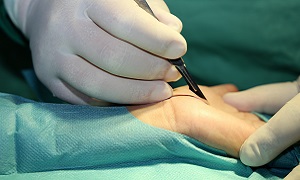
During open surgery, your surgeon makes an incision in the palm of your hand as well as over the carpal tunnel and cuts through the ligament for freeing the nerve. It is best that you discuss the benefits and risks of each technique with your surgeon before the surgery is performed.
Risks
It is also important to note that the surgery possesses a few risks which include:
- Incomplete release of the ligament
- Scar formation
- Wound infections
- Injuries to your nerves or blood vessels
During the healing process after your surgery, the ligament tissues will gradually grow back together and allow more room for the nerve. Usually, this internal process takes several months, but the skin will heal in just a few weeks.
Once the ligament has healed, your doctor might gradually encourage you to use your hand and you can gradually return to using your hand normally like before. If your symptoms were severe, they might not go away completely after the surgery.
You should also keep in mind to avoid forceful hand motions or extreme wrist positions.

